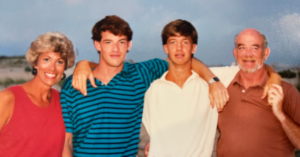They say pressure makes diamonds, but how much pressure is too much for our kids? I am constantly wavering about being proud of my kids for good grades and feeling overwhelmed with how much work they have to do. The same goes for sports as I’m the loudest one cheering on the sidelines, but sometimes brought to tears when they have a hard loss.
We wanted to discuss how to deal with setbacks, so we brought Michelle Icard onto the podcast to tell us how to turn failures into character-building moments, something she lays out in her new book, 8 Setbacks That Can Make a Child a Success.
Feeling Safe & Seen
Icard’s book lays out the eight most common ways that most teens fail at some point during adolescence. If you are a parent, you will probably see your kid in one or several of these archetypes. They are the Rebel – fails to follow the rules, the Daredevil – fails to take care of their body, the Misfit – failing to perform at school, the Ego – fails to show concern for others, the Loner – fails to connect with their peers, the Sensitive One – fails to handle their feelings, the Black Sheep – fails to get along with their family, and the Benchwarmer – fails to believe in themselves.
When Icard shared these archetypes, Penn was quick to identify that during his childhood he was the Sensitive One and later in college became the Ego. (If you followed me through my Enneagram journey, you know I hate being categorized but I see the benefit of these archetypes.) Kids desire to feel safe and feel seen and Icard says having an outline of how our kids identify can help us parents…parent better.
Evolving Past Failure
Icard defines a failure as when a child experiences a feeling that leaves them unmoored or unaccepted. Learning how to cope with those feelings help kids cross the threshold from childhood to adulthood. And so does letting your kids fail. It’s a tough pill to swallow, but I know I’m hurting my kid in the long run if I make things too easy OR traumatically hard for no reason.
We talk about the 3-step approach for problem solving common failures. It’s important to schedule a time to talk, share your own mental health journey, and try to keep your face emotionally uninvested as your kid shares their feelings.
What was helpful for you to hear? Listen and let us know in the comments.
- Acast: https://open.acast.com/public/streams/618c3caaa322d1001350082c/episodes/64f60c1e19be9c0010cb62ff.mp3
- Apple Podcasts: https://podcasts.apple.com/us/podcast/the-holderness-family-podcast/id1378725018?i=1000626779458
- Spotify: https://open.spotify.com/episode/4o01LmGqQJIFM98Sr2XKg5?si=bee09065c6124e9c
- Pandora: https://pandora.app.link/r6nE71PqQCb
- Amazon: https://music.amazon.com/podcasts/094464e9-aad9-4b09-8ee8-248c76b48bd6/episodes/aa8fad1c-cb3b-4ab6-ad3b-2793596bce56/the-holderness-family-podcast-helping-kids-and-us-with-failure-with-michelle-icard




